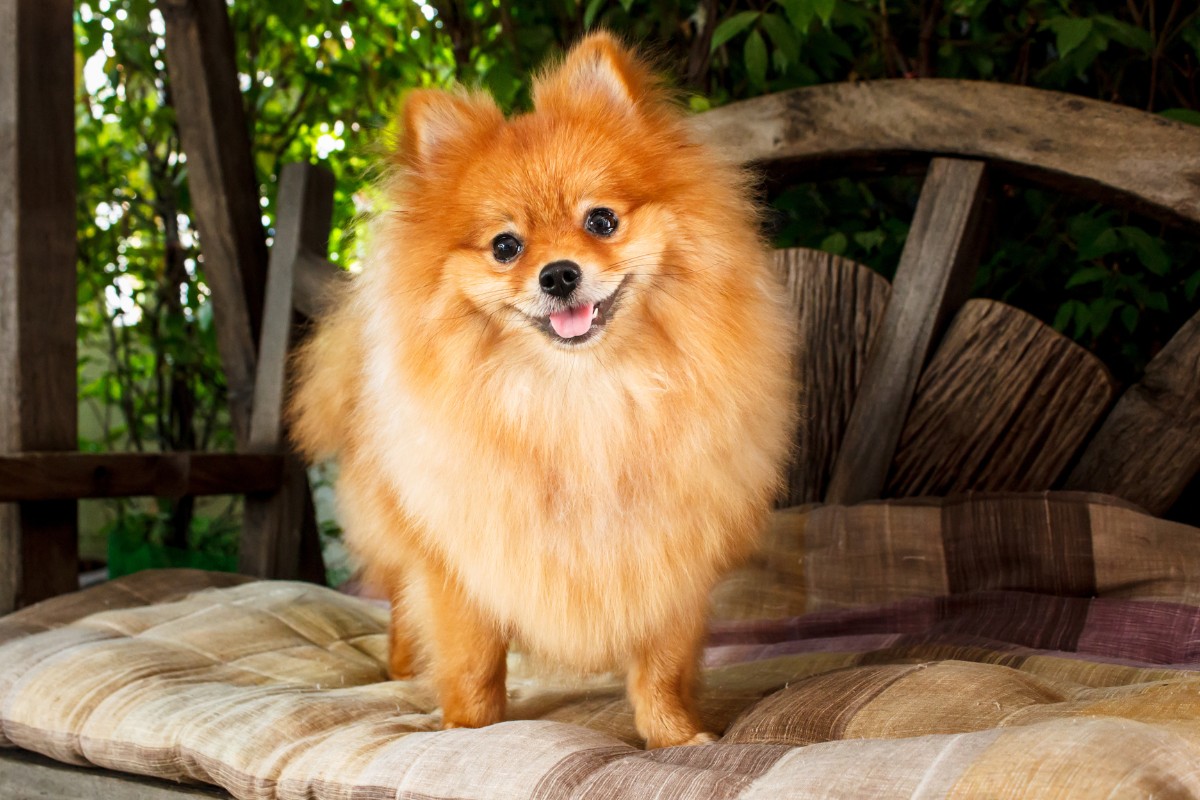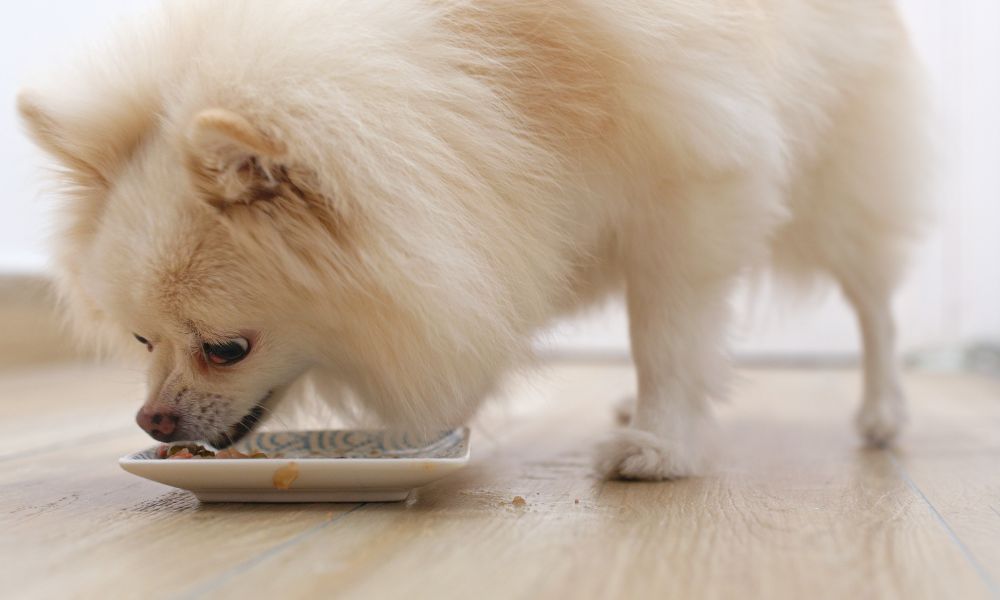 2 Nov
2 NovCan Pomeranian Eat Yogurt?
Their bright eyes seem to beg for a taste of what’s on our plates, don’t they? Now, when it comes to sharing human foods with our furry companions, it’s crucial to pause and consider what’s safe for them. One common question I come across is whether Pomeranians can eat yogurt.
Yes, Pomeranians can eat yogurt. However, it should be plain, unsweetened yogurt and served in moderation. Yogurt contains probiotics, which can benefit a Pomeranian’s digestive system and is a good source of calcium and protein. When choosing yogurt for your Pomeranian, opt for varieties that are free of artificial sweeteners like xylitol, which is toxic to dogs.
Yogurt is often touted for its health benefits in humans, but can our Pom friends reap the same rewards without any risks? It’s important to remember that while these adorable pups may be sturdy in spirit, they have specific dietary needs that are quite different from ours. As someone who’s navigated the world of canine nutrition for years, I’ve learned that what works for us doesn’t always work for them.
So, before you reach for that spoon to share a dollop of your snack with your four-legged pal, let’s take a moment to understand the ins and outs of yogurt in a Pomeranian’s diet. Ensuring we’re informed can make all the difference in maintaining their health and happiness.
The Health Benefits of Yogurt for Pomeranians
Yogurt, when chosen and served correctly, can be a healthy addition to a Pomeranian’s diet due to its nutritional content. Let’s unpack the key health benefits of incorporating a small amount of yogurt into your Pom’s diet.
Probiotics and Digestive Health: The Role of Good Bacteria
Probiotics are live microorganisms that provide health benefits when consumed. These are often referred to as “good” bacteria because they help maintain a healthy balance of microflora in the digestive system.
For Pomeranians, who may sometimes suffer from digestive issues, incorporating a source of probiotics like plain yogurt can support a healthy gut. It aids in digestion and helps to combat the growth of harmful bacteria, potentially reducing gastrointestinal problems such as diarrhea and upset stomach.

Calcium and Bone Health: Why It’s Important for Pomeranians
Calcium plays a pivotal role in the development and maintenance of strong bones, which is particularly important for small breeds like Pomeranians. They can be prone to dental issues and bone disorders, so calcium is a key nutrient for their overall health. Yogurt is a good source of calcium, which helps in supporting not only their skeletal structure but also vital functions like heart health and muscle contractions.
Protein Content: Muscle Maintenance and Overall Health
Protein is a fundamental component of any dog’s diet, contributing to muscle maintenance and overall health. Pomeranians, with their active disposition, require a consistent supply of high-quality protein to maintain their energy levels and muscle mass.
Yogurt can be a good source of protein, particularly Greek yogurt, which typically contains higher protein content than regular yogurt. However, it’s crucial to ensure that the protein in yogurt complements a balanced diet tailored to your Pomeranian’s specific needs.
Potential Risks and Considerations
When considering yogurt for your Pomeranian, it’s important to weigh the potential health benefits against the possible risks. While yogurt can be a nutritious treat, there are several factors to keep in mind to ensure it’s a healthy choice for your pet.
Lactose Intolerance in Dogs: Signs to Watch Out For
Not all dogs digest dairy products well. Lactose intolerance occurs when dogs have difficulty digesting lactose, the sugar found in milk products. Pomeranians, like some other breeds, can be sensitive to lactose, especially in their adult years.
Symptoms of lactose intolerance in dogs may include diarrhea, gas, bloating, and abdominal discomfort. If you notice any of these signs after feeding yogurt to your Pomeranian, it’s best to eliminate dairy from their diet and consult your veterinarian.
High Sugar and Fat Content in Certain Yogurts: How to Choose the Right Type
Many yogurts on the market are packed with added sugars and high levels of fat which are not suitable for dogs. Pomeranians, in particular, are prone to obesity and dental issues that can be exacerbated by sugary, high-fat foods. To avoid these risks, choose plain, unsweetened yogurts with no added flavors or sugars. Additionally, opt for low-fat or non-fat varieties to keep your Pom’s calorie intake in check.
Artificial Sweeteners: The Danger of Xylitol and Other Additives
Some yogurts contain artificial sweeteners that are harmful to dogs. Xylitol, in particular, is an artificial sweetener found in some sugar-free products, and it is highly toxic to dogs. Ingestion can lead to a rapid release of insulin, causing hypoglycemia (low blood sugar), which can be life-threatening.
Always read the ingredient label on yogurt containers to ensure they do not contain xylitol or other harmful additives before sharing them with your Pomeranian.
Choosing the Right Yogurt for Your Pomeranian
When it comes to offering yogurt to your Pomeranian, selecting the right type is critical for their health. Not all yogurts are created equal, and some can be more harmful than beneficial. Here’s how to make the best choice for your furry friend.
Plain, Non-Fat, or Low-Fat Options: What’s Best for Your Pet?
Plain, non-fat, or low-fat yogurt is typically the best option for your Pomeranian. Full-fat yogurts can contribute to weight gain and other health issues due to their high calorie and fat content, which isn’t ideal for small breeds prone to obesity. Plain yogurt without added flavors or sugars is also less likely to upset your dog’s stomach and is easier for them to digest.
The Debate on Flavored vs. Unflavored Yogurt
While flavored yogurts might be tempting to share with your Pomeranian, they often come with a host of unnecessary sugars and artificial flavors that do not provide any health benefits to your dog. In fact, these additives can lead to health issues such as obesity and diabetes. Stick with unflavored yogurt to avoid these risks, and never offer yogurts with artificial sweeteners like xylitol, as they are toxic to dogs.
Organic vs. Conventional: Is There a Difference for Your Dog?
When choosing between organic and conventional yogurt, the primary consideration is the presence of additives, pesticides, and growth hormones. Organic yogurts are made from milk from cows that have not been treated with antibiotics or growth hormones and are fed an organic diet.
This can be beneficial for your Pomeranian’s overall health, as it reduces their exposure to these substances. However, the most crucial factor is that the yogurt is plain and free of sweeteners and excessive fat, regardless of whether it is organic or conventional.

How to Safely Introduce Yogurt into Your Pomeranian’s Diet
Introducing yogurt into your Pomeranian’s diet should be done cautiously and gradually to ensure it agrees with their delicate digestive systems. Here’s a step-by-step guide on how to do this safely:
Starting with Small Amounts: How Much is Enough?
Begin by offering your Pomeranian a very small amount of plain, non-fat, or low-fat yogurt. A teaspoon is sufficient to start. This modest portion is enough to gauge how your pet reacts without overwhelming their system. Observe your pet closely after they consume the yogurt for any signs of discomfort or allergic reaction.
Frequency: How Often Can Pomeranians Eat Yogurt?
If your Pomeranian shows no adverse reactions to the initial serving of yogurt, you can consider making it a regular treat. Once or twice a week is a good frequency to aim for. This regularity supports dietary stability, ensuring that your dog reaps the probiotic benefits without the risk of overconsumption.
Signs of a Good Reaction vs. a Bad Reaction
A good reaction to yogurt will mean your Pomeranian shows no signs of gastrointestinal upset after eating it. You might also notice improvements in their digestion and stool quality due to the probiotics in the yogurt.
Conversely, a bad reaction may include symptoms like diarrhea, vomiting, excessive gas, or signs of abdominal discomfort. If your Pomeranian is lactose intolerant, even a small amount of yogurt may cause these symptoms. If you observe any of these reactions, discontinue feeding yogurt immediately and consult your vet.
Alternatives to Yogurt for Pomeranians with Dietary Restrictions
For Pomeranians with dietary restrictions or those who don’t tolerate dairy well, there are alternative ways to ensure they receive the beneficial probiotics found in yogurt without the lactose that can cause digestive issues. Here are some safe options for your Pomeranian:
Other Probiotic-rich Foods Safe for Pomeranians
- Probiotic Supplements: There are canine-specific probiotic supplements available that can provide the same benefits as yogurt. These are often tailored for dogs’ digestive systems and can be a good alternative.
- Fermented Vegetables: Small amounts of fermented vegetables like carrots or green beans can be a source of probiotics. Always serve them plain and in moderation.
- Kefir: Low-lactose kefirs are fermented milk drinks with probiotics, but they usually contain less lactose than yogurt and might be better tolerated. Make sure they are plain and free of any additives or sweeteners.
Non-dairy Alternatives: Are They a Better Option?
Non-dairy alternatives can be a safer option for Pomeranians who are lactose intolerant or have allergies related to dairy products. Here are a few non-dairy foods that can sometimes offer probiotic benefits:
- Coconut Milk Yogurt: A non-dairy yogurt alternative that can be easier on a dog’s stomach. Ensure it’s unsweetened and does not contain any artificial sweeteners.
- Water Kefir: This is a fermented beverage made using water kefir grains and can be a source of probiotics. Again, this should be given in small amounts and without added sugars.
- Probiotic-rich Treats: Some dog treats are made with probiotics. These can be a convenient way to supplement probiotics in your Pomeranian’s diet.
When introducing any new food to your Pomeranian’s diet, it’s essential to do so gradually to monitor for any adverse reactions. Even with non-dairy alternatives, you should look for signs of digestive distress and consult with your vet to ensure the alternative is safe and appropriate for your dog’s specific dietary needs.




